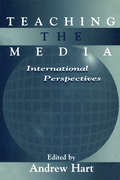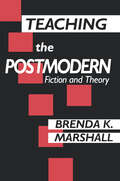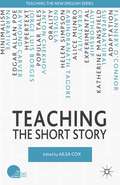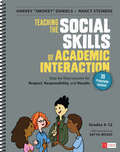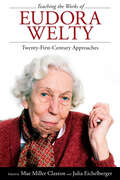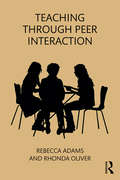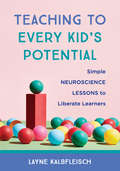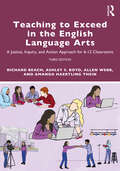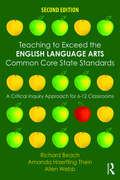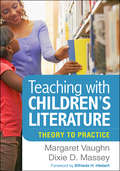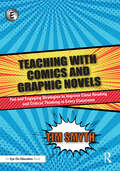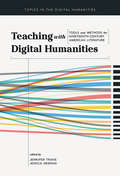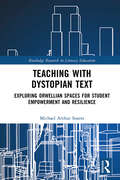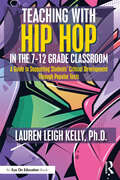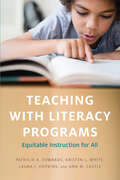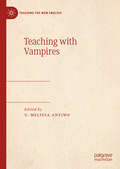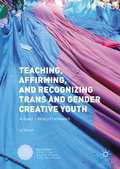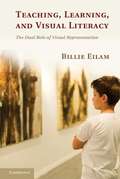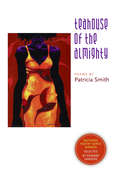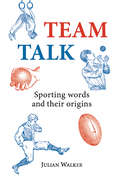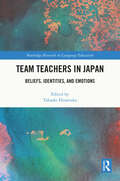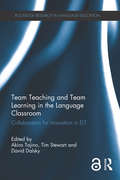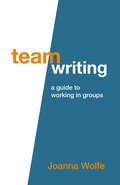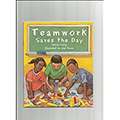- Table View
- List View
Teaching the Media: International Perspectives (Routledge Communication Series)
by Andrew HartIn TEACHING THE MEDIA: INTERNATIONAL PERSPECTIVES Andrew Hart initiates a challenging dialogue about approaches to Media teaching in the major English-speaking nations of the world, including the United States, Canada, the United Kingdom, Australia, and South Africa. By animating actual lessons and the considered views of classroom practitioners, TEACHING THE MEDIA encourages readers to develop new perspectives on Media teaching, to examine approaches that differ from their own, and to reflect critically on their own practices with a view to understanding them more fully and enhancing their effectiveness in the classroom. Based on original research that began in England in the early 1990s, this is the first international comparative study to focus on Media Education in English-speaking countries. It systematically examines classroom strategies for Media teaching in the light of the major theoretical paradigms which have emerged globally over the last 50 years. It analyses the rich diversity of different educational concerns, goals, and classroom practices through a series of national studies of teachers and lessons. As a result, not only do we see how Media is actually taught in range of classroom contexts, but existing models of Media teaching can now be more precisely critiqued and made more accessible for further research and development.
Teaching the Postmodern
by Brenda MarshallFirst published in 1992. Routledge is an imprint of Taylor & Francis, an informa company.
Teaching the Short Story
by Ailsa CoxThe short story is moving from relative neglect to a central position in the curriculum; as a teaching tool, it offers students a route into many complex areas, including critical theory, gender studies, postcolonialism and genre. This book offers a practical guide to the short story in the classroom, covering all these fields and more.
Teaching the Social Skills of Academic Interaction, Grades 4-12: Step-by-Step Lessons for Respect, Responsibility, and Results (Corwin Literacy)
by Smokey Daniels Nancy H. SteinekeNEWS FLASH: A major meta-analysis of 213 studies showed an average 11 percent gain in academic performance for kids receiving explicit social-academic learning instruction. Turns out this "soft stuff" about creating a culture of respect and rapport yields hard and fast gains, and that’s no surprise to collaboration "gurus" Harvey "Smokey" Daniels and Nancy Steineke. Now, these authors share a yearlong plan for helping you build powerful and binding peer-to-peer interactions. The added bonus: Your kids will meet speaking and listening standards, while you score better on classroom-engagement rubrics. Teaching the Social Skills of Academic Interaction taps the instructional power of slides, full-color illustrations, and super succinct directions to teach both the language and the behaviors of working effectively with others. These 35 lessons take your kids on a carefully paced upward spiral of collaboration, with explicit coaching on how to speak, listen, argue, persuade—and get along. Here’s the best part: You model and your students practice these social skills with the content of your curriculum, not in disconnected add-on exercises. For each lesson, there are six to 25 slides that focus on one vital academic-social skill; step-by-step teaching tips are in the lie-flat planning book. The sequence looks mostly like this: The first slides introduce the skill—like being a good partner or arguing both sides of a controversial topic—then explain its value. The next slides help model the skill in action, using whatever curricular topic you happen to be teaching. Now, kids’ active thinking is invited as you co-create strategies to enhance use of the target social-academic skill. Additional slides help kids practice the skill using your curricular content as you monitor and support. Lessons end with a debriefing to solidify new understandings. Any way you look at Teaching the Social Skills of Academic Interaction, it’s a win-win. Your students realize better engagement in curriculum topics, higher performance, and social skills to last a lifetime. That’s really college and career ready! And our schools become safer harbors, where students know one another, respect one another, and learn together. Longtime collaborators themselves, HARVEY "SMOKEY" DANIELS and NANCY STEINEKE have written six books together and are regular co-presenters at all the major literacy conferences. Both are former public school teachers who now work as national consultants, helping schools and districts to create friendly, supportive, and collaborative climates for young people. For an author-led walk-through of Teaching the Social Skills of Academic Interaction, visit https://www.brainshark.com/corwinpress/teachingsocialskills.
Teaching the Works of Eudora Welty: Twenty-First-Century Approaches
by Mae Miller Claxton and Julia EichelbergerContributions by Jacob Agner, Sharon Deykin Baris, Carolyn J. Brown, Lee Anne Bryan, Keith Cartwright, Stuart Christie, Mae Miller Claxton, Virginia Ottley Craighill, David A. Davis, Susan V. Donaldson, Julia Eichelberger, Kevin Eyster, Dolores Flores-Silva, Sarah Gilbreath Ford, Stephen M. Fuller, Dawn Gilchrist, Rebecca L. Harrison, Casey Kayser, Michael Kreyling, Ebony Lumumba, Suzanne Marrs, Pearl Amelia McHaney, David McWhirter, Laura Sloan Patterson, Harriet Pollack, Gary Richards, Christin Marie Taylor, Annette Trefzer, Alec Valentine, Adrienne Akins Warfield, Keri Watson, and Amy WeldonToo often Eudora Welty is known to the general public as Miss Welty, a "perfect lady" who wrote affectionate portraits of her home region. Yet recent scholarship has amply demonstrated a richer complexity. Welty was an innovative artist with cosmopolitan sensibilities and progressive politics, a woman who maintained close friendships with artists and intellectuals throughout the world, a writer as unafraid to experiment as she was to level her pen at the worst human foibles.The essays collected in Teaching the Works of Eudora Welty seek to move Welty beyond a discussion of region and reflect new scholarship that remaps her work onto a larger canvas. The book offers ways to help twenty-first-century readers navigate Welty's challenging and intricate narratives. It provides answers to questions many teachers will have: Why should I study a writer who documents white privilege? Why should I give this "regional" writer space on an already crowded syllabus? Why should I teach Welty if I do not study the South? How can I help my students make sense of her modernist narratives? How can Welty's texts help me teach my students about literary theory, about gender and disability, about cultures and societies with which my students are unfamiliar?
Teaching through Peer Interaction
by Rhonda Oliver Rebecca AdamsTeaching through Peer Interaction prepares teachers to use peer communication in the classroom. It presents current research of peer interaction and language learning for teachers, including background on the role of peer interaction in classroom language learning, guidelines for adopting and adapting peer interaction opportunities in real classrooms, and perspectives on teachers’ frequently expressed concerns and questions about peer interaction. Practical and comprehensive, this text brings together information on peer communication across the different skill areas, for different learners, in different contexts, and includes discussion on assessment. The text is replete with sample activities, tasks, and instructional sequences to aid teachers' understanding of how to use peer interaction effectively in a range of classroom settings, making it the ideal textbook for upper-level undergraduate and graduate students in language education programs, as well as in-service teachers.
Teaching to Every Kid's Potential: Simple Neuroscience Lessons To Liberate Learners
by Layne Kalbfleisch MED, PhD“Teachers hold the potential to provide a student with frustration or opportunity every day—and those states are closer together than you might think.” When students repeatedly lose track of directions or take a long time to solve problems, it’s easy for teachers to see the distracted or off-task behavior, but not always to see the root of the problem. Quite often the same child who has an underdeveloped skill may have an opposing but hidden strength: a slow processor of information may also be a deep thinker. Teaching to Every Kid’s Potential is an invitation to teachers to improve the learning in their classrooms, one student at a time, using practical, evidence-based strategies. Focusing on four big concepts from neuroscience—flexibility, readiness, connection, and masking—the author shows how to apply them to build on the strengths of students. Each chapter unpacks the science; shows how talents can compensate for neural processing issues and suggests small but powerful adjustments to classroom practice that can allow kids’ gifts to emerge.
Teaching to Exceed in the English Language Arts: A Justice, Inquiry, and Action Approach for 6-12 Classrooms
by Richard Beach Amanda Haertling Thein Allen Webb Ashley S. BoydTimely, thoughtful, and comprehensive, this text directly supports pre-service and in-service teachers in developing curriculum and instruction that both addresses and exceeds the requirements of English language arts standards. It demonstrates how the Common Core State Standards as well as other local and national standards’ highest and best intentions for student success can be implemented from a critical, culturally relevant perspective firmly grounded in current literacy learning theory and research. The third edition frames ELA instruction around adopting a justice, inquiry, and action approach that supports students in their schools and community contexts. Offering new ways to respond to current issues and events, the text provides specific examples of teachers employing the justice, inquiry, and action curriculum framework to promote critical engagement and learning. Chapters cover common problems and challenges, alternative models, and theories of language arts teaching. The framework, knowledge, and guidance in this book shows how ELA standards can not only be addressed but also surpassed through engaging instruction to foster truly diverse and inclusive classrooms. The third edition provides new material on: adopting a justice, inquiry, and action approach to enhance student engagement and critical thinking planning instruction to effectively implement standards in the classroom teaching literary and informational texts, with a focus on authors of color integrating drama activities into literature teaching informational, explanatory, argumentative, and narrative writing supporting bilingual/ELL students using digital tools and apps to respond to and create digital texts addressing how larger contextual and political factors shape instruction fostering preservice teacher development
Teaching to Exceed the English Language Arts Common Core State Standards: A Critical Inquiry Approach for 6-12 Classrooms
by Richard Beach Amanda Haertling Thein Allen WebbTimely, thoughtful, and comprehensive, this text directly supports pre-service and in-service teachers in developing curriculum and instruction that both addresses and exceeds the requirements of the Common Core State Standards. Adopting a critical inquiry approach, it demonstrates how the Standards' highest and best intentions for student success can be implemented from a critical, culturally relevant perspective firmly grounded in current literacy learning theory and research. It provides specific examples of teachers using the critical inquiry curriculum framework of identifying problems and issues, adopting alternative perspectives, and entertaining change in their classrooms to illustrate how the Standards can not only be addressed but also surpassed through engaging instruction. The Second Edition provides new material on adopting a critical inquiry approach to enhance student engagement and critical thinking planning instruction to effectively implement the CCSS in the classroom fostering critical response to literary and informational texts using YA literature and literature by authors of color integrating drama activities into literature and speaking/listening instruction teaching informational, explanatory, argumentative, and narrative writing working with ELL students to address the language Standards using digital tools and apps to respond to and create digital texts employing formative assessment to provide supportive feedback preparing students for the PARCC and Smarter Balanced assessments using the book's wiki site http://englishccss.pbworks.com for further resources
Teaching with Children's Literature: Theory to Practice
by Margaret Vaughn Dixie D. MasseyPerhaps no factor has a greater influence on children&’s literacy learning than exposure to engaging, authentic, culturally relevant texts. This concise practitioner resource and course text helps K–8 teachers make informed choices about using children's literature in their classrooms, from selecting high-quality texts to planning instruction and promoting independent reading. The authors present relevant theories (such as reader response and culturally responsive pedagogy) and show how to apply them in practice. Key topics include teaching narrative and expository texts, tapping into students' individual interests, and conducting text-based writing activities and discussions. Every chapter features case examples, reflection questions, and learning activities for teachers; appendices list exemplary children&’s literature.
Teaching with Comics and Graphic Novels: Fun and Engaging Strategies to Improve Close Reading and Critical Thinking in Every Classroom
by Tim Smyth35th Annual Will Eisner Comic Industry Awards Nominee! This text will allow you to harness students’ love of comics and graphic novels while increasing critical thinking and engagement in the classroom. Author Tim Smyth offers a wide variety of lessons and ideas for using comics to teach close reading, working with textual evidence, literature adaptations, symbolism and culture, sequencing, essay writing, and more. He also models how to use comics to tackle tough topics and enhance social-emotional learning. Throughout the book, you’ll find a multitude of practical resources, including a variety of lesson plans—some quick and easy activities as well as more detailed ready-to-use unit plans. These thoughtful lessons meet the Common Core State Standards and are easy to adapt for any subject area or grade level to fit into your curriculum. Add this book to your professional library and you’ll have a new and exciting way of reaching and teaching your students!
Teaching with Digital Humanities: Tools and Methods for Nineteenth-Century American Literature (Topics in the Digital Humanities)
by Jennifer Travis Jessica DeSpainJennifer Travis and Jessica DeSpain present a long-overdue collection of theoretical perspectives and case studies aimed at teaching nineteenth-century American literature using digital humanities tools and methods. Scholars foundational to the development of digital humanities join educators who have made digital methods central to their practices. Together they discuss and illustrate how digital pedagogies deepen student learning. The collection's innovative approach allows the works to be read in any order. Dividing the essays into five sections, Travis and DeSpain curate conversations on the value of project-based, collaborative learning; examples of real-world assignments where students combine close, collaborative, and computational reading; how digital humanities aids in the consideration of marginal texts; the ways in which an ethics of care can help students organize artifacts; and how an activist approach affects debates central to the study of difference in the nineteenth century.
Teaching with Dystopian Text: Exploring Orwellian Spaces for Student Empowerment and Resilience (Routledge Research in Literacy Education)
by Michael Arthur SoaresTeaching with Dystopian Text propounds an exchange of spatial to pedagogical practices centered around “Orwellian Spaces,” signaling a new utility for teaching with dystopian texts in secondary education. The volume details the urgency of dystopian texts for secondary students, providing theoretical frameworks, classroom examples and practical research. The function of dystopian texts, such as George Orwell’s 1984, as social and political critique is demonstrated as central to their power. Teaching with Dystopian Text: Exploring Orwellian Spaces for Student Empowerment and Resilience makes a case that dystopian texts can be instrumental in the transfer of spatial practices to pedagogical practices. Pedagogical application creates links between the text and the student through defamiliarization, connecting the student to practices of resistance in the space of the classroom. The volume also addresses the challenges of teaching dystopian text in a dystopian educational climate including the COVID-19 lockdown. In addition to appealing to scholars and researchers of literacy education, language education and dystopian text, this book will also be a powerful yet accessible resource for secondary teachers as they address dystopian concerns with students in the complicated twenty-first century.
Teaching with Hip Hop in the 7-12 Grade Classroom: A Guide to Supporting Students’ Critical Development Through Popular Texts
by Lauren Leigh KellyThis book presents practical approaches for engaging with Hip Hop music and culture in the classroom. As the most popular form of music and youth culture today, Hip Hop is a powerful medium through which students can explore their identities and locate themselves in our social world. Designed for novice and veteran teachers, this book is filled with pedagogical tools, strategies, lesson plans, and real-world guidance on integrating Hip Hop into the curriculum. Through a wide range of approaches and insights, Lauren Leigh Kelly invites teachers to look to popular media culture to support students’ development and critical engagement with texts. Covering classroom practice, assessment strategies, and curricular and standards-based guidelines, the lessons in this book will bolster students’ linguistic and critical thinking skills and help students to better understand and act upon the societal forces around them. The varied activities, assignments, and handouts are designed to inspire teachers and easily facilitate modification of the assignments to suit their own contexts. The impact of Hip Hop on youth culture is undeniable, now more than ever; this is the perfect book for teachers who want to connect with their students, support meaning-making in the classroom, affirm the validity of youth culture, and foster an inclusive and engaging classroom environment.
Teaching with Literacy Programs: Equitable Instruction for All
by Patricia A. Edwards Kristen L. White Ann M. Castle Laura J. HopkinsA step-by-step guide to developing equitable literacy instruction by adapting curriculum to support diverse learners. In Teaching with Literacy Programs, Patricia A. Edwards, Kristen L. White, Laura J. Hopkins, and Ann M. Castle present a model that allows educators to address educational inequity through the critical and adaptive use of existing literacy curriculum materials. In this accessible work, they advise educators on ways to combine common classroom materials, such as basal readers and core reading programs, with instructional practices that provide high-quality, responsive instruction to all students. Edwards, White, Hopkins, and Castle credit literacy instruction as a core part of overall educational equity, and they recognize the crucial role that educators play in translating materials into instruction that benefits all learners. Here they offer teacher education in support of this essential role, deftly guiding educators through a four-part development process, CARE, an acronym for cultivating critical consciousness, analyzing materials, reconstructing curricula, and evaluating instruction reflectively to advance equity. Built upon culturally relevant, sustaining, and antiracist pedagogy, CARE enables teachers to provide literacy instruction that meets the range of needs and performance levels in classrooms, supporting students in attaining academic achievement, cultural competence, and critical consciousness. The approach outlined in this work, which can be put into immediate practice, helps educators to provide literacy instruction that builds on students' multiple literacies and reduces educational inequity.
Teaching with Vampires (Teaching the New English)
by U. Melissa AnyiwoThis edited volume provides pedagogical tools for those who teach – and would like to teach – with the most iconic of monsters: the vampire. Vampires are showing up with increasing frequency in the college classroom and there are a growing number of courses devoted solely to the Undead. This collection draws from a diverse range of teaching approaches, including the theoretical framing of vampire texts in a broad range of settings, that demonstrate the myriad of ways vampires are used to teach about marginalization, empathy, and inspire social justice. With chapters from global scholars, this essential text illustrates the burgeoning field of vampire studies and the popularity in classrooms at every level around the world, from gothic fiction to television courses.
Teaching, Affirming, and Recognizing Trans and Gender Creative Youth: A Queer Literacy Framework (Queer Studies and Education)
by Sj MillerWinner of the 2018 Outstanding Book by the Michigan Council Teachers of EnglishChoice magazine as an Outstanding Academic Title for 2018Winner of the 2017 AERA Division K (Teaching and Teacher Education) Exemplary Research AwardThis book draws upon a queer literacy framework to map out examples for teaching literacy across pre-K-12 schooling. To date, there are no comprehensive Pre-K-12 texts for literacy teacher educators and theorists to use to show successful models of how practicing classroom teachers affirm differential (a)gender bodied realities across curriculum and schooling practices. This book aims to highlight how these enactments can be made readily conscious to teachers as a reminder that gender normativity has established violent and unstable social and educational climates for the millennial generation of lesbian, gay, bisexual, transgender, intersex, (a)gender/(a)sexual, gender creative, and questioning youth.
Teaching, Learning, and Visual Literacy
by Billie EilamVisual literacy is an increasingly critical skill in a globalizing, digital world. This book addresses the core issues concerning visual literacy in education, underscoring its importance for the instruction of students and educators. Professor Billie Eilam argues that the incorporation of visual skill development in teacher training programs will help break the cycle of visual illiteracy. Understanding the pedagogical benefits and risks of visual representation can help educators develop effective strategies to produce visually literate students. Eilam presents a broad overview of theoretical knowledge regarding visual representation, as well as a discussion of best practices for the use of visual elements in schools. In addition to theory, Eilam includes practical exercises for introducing visual literacy into teacher education, offering strategies for analyzing visualization in curricula and for increasing awareness of visual culture.
Teahouse of the Almighty
by Patricia SmithA National Poetry Series winner, chosen by Edward Sanders."What power. Smith's poetry is all poetry. And visceral. Her poems get under the skin of their subjects. Their passion and empathy, their real worldliness, are blockbuster."--Marvin Bell"I was weeping for the beauty of poetry when I reached the end of the final poem."--Edward Sanders, National Poetry Series judgeFrom Lollapalooza to Carnegie Hall, Patricia Smith has taken the stage as this nation's premier performance poet. Featured in the film Slamnation and on the HBO series Def Poetry Jam, Smith is back with her first book in over a decade--a National Poetry Series winner weaving passionate, bluesy narratives into an empowering, finely tuned cele-bration of poetry's liberating power.
Team Talk
by Julian WalkerHave you ever wondered why we talk about a handicap in sport, why boxing is so named, or whether a dumbbell ever rang? It was during the nineteenth century that hitherto local games with relaxed and varying rules were formalized. During this process terminologies developed to refer to these new standardized sports, borrowing, modifying and redefining words from all walks of life in sometimes strange and unexpected ways. Considering such subjects as why sport shares so many words with the fields of hunting and conflict, and how English sports terms have been both adopted from and given to other languages, this book looks at how words have come into the field of sport and how they have developed and changed.
Team Teachers in Japan: Beliefs, Identities, and Emotions (Routledge Research in Language Education)
by Takaaki HiratsukaThis book provides insights into the professional and personal lives of local language teachers and foreign language teachers who conduct team-taught lessons together. It does this by using the Japanese context as an illustrative example. It re-explores in this context the professional experiences and personal positionings of Japanese teachers of English (JTEs) and foreign assistant language teachers (ALTs), as well as their team-teaching practices in Japan. This edited book is innovative in that 14 original empirical studies offer a comprehensive overview of the day-to-day professional experiences and realities of these team teachers in Japan, with its focus on their cognitive, ideological, and affective components. This is a multifaceted exploration into team teachers in their gestalt—who they are to themselves and in relation to their students, colleagues, community members, and crucially to their teaching partners. This book therefore offers several empirical and practical applications for future endeavors involving team teachers and those who engage with them—including their key stakeholders, such as researchers on them, their teacher educators, local boards of education, governments, and language learners from around the world.
Team Teaching and Team Learning in the Language Classroom: Collaboration for innovation in ELT (Routledge Research in Language Education)
by Akira Tajino Tim Stewart David DalskyThis book reignites discussion on the importance of collaboration and innovation in language education. The pivotal difference highlighted in this volume is the concept of team learning through collaborative relationships such as team teaching. It explores ways in which team learning happens in ELT environments and what emerges from these explorations is a more robust concept of team learning in language education. Coupled with this deeper understanding, the value of participant research is emphasised by defining the notion of ‘team’ to include all participants in the educational experience. Authors in this volume position practice ahead of theory as they struggle to make sense of the complex phenomena of language teaching and learning. The focus of this book is on the nexus between ELT theory and practice as viewed through the lens of collaboration. The volume aims to add to the current knowledge base in order to bridge the theory-practice gap regarding collaboration for innovation in language classrooms.
Team Writing: A Guide to Working in Groups
by Joanna WolfeBuilt around real group interactions, Team Writing is a flexible, hybrid resource that pairs videos with a brief print book. Based on research revealing major problems at all stages of peer group work, the book shows how written communication can help technical writing students contribute to team projects in a meaningful way — and provides strategies for dealing with the breakdowns that can derail a project’s success. Numerous examples highlight the kind of written communication that helps teams thrive. Short, Web-based videos depict student teams in action, going beyond the textbook to show what real collaboration looks and sounds like.
Teams Work Together (Reach Into Phonics Ser.)
by Deborah J. Short Joanna Korba Will JimmersonNIMAC-sourced textbook
